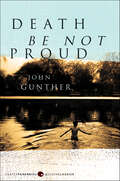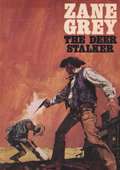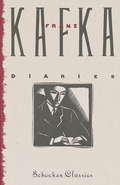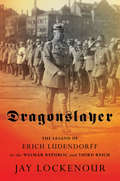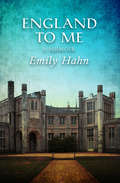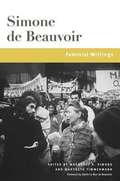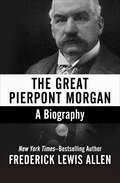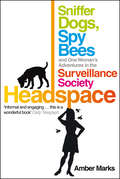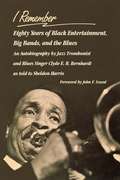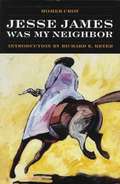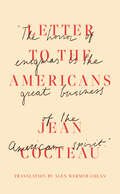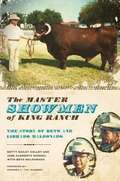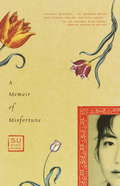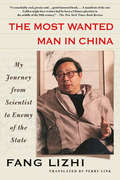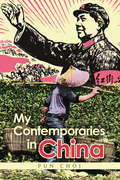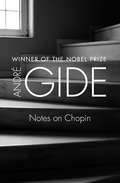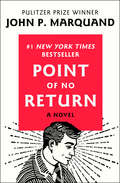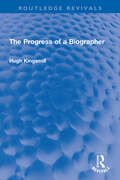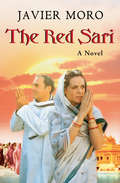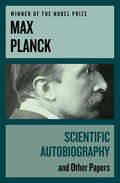- Table View
- List View
Death Be Not Proud
by John J. Gunther"If courage is the antidote to pain and grief, the disease and the cure are both in this book. . . . A story of great unselfishness and great heroism." —New York TimesJohnny Gunther was only seventeen years old when he died of a brain tumor. During the months of his illness, everyone near him was unforgettably impressed by his level-headed courage, his wit and quiet friendliness, and, above all, his unfaltering patience through times of despair. This deeply moving book is a father's memoir of a brave, intelligent, and spirited boy.
Death be Not Proud: A Memoir
by John GuntherBook Description Johnny Gunther was only seventeen years old when he died of a brain tumor. During the months of his illness, everyone near him was unforgettably impressed by his level-headed courage, his wit and quiet friendliness, and, above all, his unfaltering patience through times of despair.
The Deer Stalker: A Western Story
by Zane GreyOriginally published in 1925, in THE DEER STALKER, Zane Grey readers will find all they have come to expect from their favorite Western author—swift action, magnificent descriptions of the desert and canyon country, plus the added valiant effort of a ranger’s struggle to save the doomed herd of deer on the Buckskin range.Zane Grey makes the reader see this colorful Arizona country, makes him feel something of the awe that is the inevitable reaction of man to the majesty of one of nature’s miracles, makes him smell the tang of mingled pine and sagebrush, makes him thrill to the heroic struggle of a few dedicated men as they battle to undo the harm of the willful and greedy.
Diaries, 1910-1923
by Franz KafkaThese diaries cover the years 1910 to 1923, the year before Kafka's death at the age of forty. They provide a penetrating look into life in Prague and into Kafka's accounts of his dreams, his feelings for the father he worshipped and the woman he could not bring himself to marry, his sense of guilt, and his feelings of being an outcast. They offer an account of a life of almost unbearable intensity.From the Trade Paperback edition.ruggles and triumphs in expressing himself as a writer.Now, for the first time in this country, the complete diaries of Franz Kafka are available in one volume. They are not only indispensable to an understanding of Kafka the man and the artist, but are a compulsively readable, haunting account of a life of almost unbearable intensity.From the Trade Paperback edition.
Dragonslayer: The Legend of Erich Ludendorff in the Weimar Republic and Third Reich (Battlegrounds: Cornell Studies in Military History)
by Jay LockenourIn this fascinating biography of the infamous ideologue Erich Ludendorff, Jay Lockenour complicates the classic depiction of this German World War I hero. Erich Ludendorff created for himself a persona that secured his place as one of the most prominent (and despicable) Germans of the twentieth century. With boundless energy and an obsession with detail, Ludendorff ascended to power and solidified a stable, public position among Germany's most influential. Between 1914 and his death in 1937, he was a war hero, a dictator, a right-wing activist, a failed putschist, a presidential candidate, a publisher, and a would-be prophet. He guided Germany's effort in the Great War between 1916 and 1918 and, importantly, set the tone for a politics of victimhood and revenge in the postwar era. Dragonslayer explores Ludendorff's life after 1918, arguing that the strange or unhinged personal traits most historians attribute to mental collapse were, in fact, integral to Ludendorff's political strategy. Lockenour asserts that Ludendorff patterned himself, sometimes consciously and sometimes unconsciously, on the dragonslayer of Germanic mythology, Siegfried—hero of the epic poem The Niebelungenlied and much admired by German nationalists. The symbolic power of this myth allowed Ludendorff to embody many Germans' fantasies of revenge after their defeat in 1918, keeping him relevant to political discourse despite his failure to hold high office or cultivate a mass following after World War I.Lockenour reveals the influence that Ludendorff's postwar career had on Germany's political culture and radical right during this tumultuous era. Dragonslayer is a tale as fabulist as fiction.
England to Me: A Memoir (American Autobiography Ser.)
by Emily HahnAuthor of such celebrated and acclaimed works as The Soong Sisters, China to Me, and Fractured Emerald: Ireland, Emily Hahn has been called by the New Yorker &“a forgotten American literary treasure.&” Now Hahn is reintroduced to a new generation of readers, bringing to light her richly textured voice and unique perspective on a world that continues to exist through both history and fiction.It was August 2nd, 1946, when we arrived. The war was not so long over that we had shed every reminder of it, even in New York, and the Queen Mary was still fitted up as a troopship. From this opening, Emily Hahn&’s England to Me takes readers into a world filled with uncertainty as she tries to settle into the English countryside after her harrowing years in the Far East. From Southampton to London, here is a portrait of a country in flux, and of a woman of strong insight determined to find her place in it.
Feminist Writings
by Sylvie Le Beauvoir Margaret A. Simons Marybeth Timmermann Simone De BeauvoirBy turns surprising and revelatory, this sixth volume in the Beauvoir Series presents newly discovered writings and lectures while providing new translations and contexts for Simone de Beauvoir's more familiar writings. Spanning Beauvoir's career from the 1940s through 1986, the pieces explain the paradoxes in her political and feminist stances, including her famous 1972 announcement of a "conversion to feminism" after decades of activism on behalf of women. Feminist Writings documents and contextualizes Beauvoir's thinking, writing, public statements, and activities in the services of causes like French divorce law reform and the rights of women in the Iranian Revolution. In addition, the volume provides new insights into Beauvoir's complex thinking and illuminates her historic role in linking the movements for sexual freedom, sexual equality, homosexual rights, and women's rights in France.
The Great Pierpont Morgan: A Biography
by Frederick Lewis AllenA revealing biography of J. P. Morgan, one of the most powerful and enigmatic financiers in history, from bestselling author Frederick Lewis Allen. Celebrated as a titan of industry by some and decried as a monopolizing robber baron by others, John Pierpont Morgan was without a doubt a dominant player in American finance at the turn of the twentieth century. He founded U.S. Steel, a conglomeration of leading steel and iron producers, which was the nation's largest coast-to-coast railroad system, and the first company to be worth more than $1 billion. Morgan was also instrumental in developing the Federal Reserve after working with political leaders to prevent a potentially devastating fiscal crisis in 1907. Indeed, he was a driving force in the modernization of American business, and the effects of his acumen and foresight continue to resonate today--on Wall Street and beyond. Additionally, known for his displays of wealth and power, Morgan was a prominent figure of the New York society scene--a member of the original one percent--as well as a notable art connoisseur with a sizable collection now housed in Manhattan's lavish Morgan Library & Museum, once his own private library. In this meticulously researched and comprehensive biography, Frederick Lewis Allen, former editor of Harper's magazine and author of Only Yesterday, delves into the life and character of a fascinating, multidimensional man. Allen also probes the evolution of the business landscape during Morgan's lifetime, when giant corporations with unparalleled economies of scale began to absorb and replace smaller competitors. This richly detailed portrait of a man whose name is inseparable from American finance is essential reading for anyone seeking a deeper understanding of banking and business history.
Headspace: Sniffer Dogs, Spy Bees and One Woman's Adventures in the Surveillance Society
by Amber MarksCrime detection has gone to the dogs and squirrels are being busted for espionage. If you've never wondered about the new direction of 'intelligence-led policing' in our society, now is the time to start. It was a chance encounter with a police sniffer-dog that drew criminal lawyer Amber Marks into the hidden world of the science of smell and its law-enforcement applications. Soon she stumbled into a wonderland of contemporary surveillance, where the spying skills of bees, dolphins and a myriad other critters were being harnessed to build a 'secure world' of bio-intelligence. From the businesses, scientists and military departments developing new smell-based surveillance technologies, to good old-fashioned police dogs, Amber discovered a secret world of security forces, where animals and scent are as important as intelligence agents and CCTV.Part polemical exploration of our burgeoning surveillance society, part humorous memoir, this intriguing book will capture your imagination and get you wondering: just who stands to benefit from all this 'security'?
I Remember
by Sheldon Harris Clyde E. Bernhardt John F. SzwedI Remember is a first-hand account of the world of black American music told by a man who has been part of that world for eighty years. Clyde E. B. Bernhardt worked with a number of bands, including King Oliver, Marion Hard, Cecil Scott, the Bascomb Brothers, and Joe Garland. He started his own band, the Blue Blazers, in 1946 and formed the Harlem Blues and Jazz Band in 1972.The book is a primary document that provides information about a part of the history of American music for which there is little documentation.
Jesse James Was My Neighbor
by Homer CroyBorn in 1883, the year after Jesse James was killed by Bob Ford and buried in his mother's backyard, Homer Croy grew up near the James farm in northwest Missouri. He talked with many old-timers who knew Jesse and Frank James and their remarkable mother, Zerelda. Eyewitness accounts (sometimes humorous) and Croy's familiarity with the milieu that produced the outlaw brothers enrich "Jesse James Was My Neighbor." Jesse read the Bible before he went out to rob a bank or train (Frank preferred Shakespeare), and he was honest except for those raids, according to Croy. The author follows the James boys, documenting their criminal activities and their human side while sorting out the growing legend. He adds a necrology of the twenty-eight bandits who rode with the James gang at one time or another.
Letter to the Americans
by Jean CocteauLike Alexis de Tocqueville a century earlier, Jean Cocteau offers a powerful reminder to Americans of their own potential—and issues In 1949, Jean Cocteau spent twenty days in New York, and began composing on the plane ride home this essay filled with the vivid impressions of his trip. With his unmistakable prose and graceful wit, he compares and contrasts French and American culture: the different values they place on art, literature, liberty, psychology, and dreams. Cocteau sees the incredibly buoyant hopes in America’s promise, while at the same time warning of the many ills that the nation will have to confront—its hypocrisy, sexism, racism, and hegemonic aspirations—in order to realize this potential. Never before translated into English, Letter to the Americans remains as timely and urgent as when it was first published in France over seventy years ago.
The Master Showmen of King Ranch
by Stephen J. "Tio" KlebergTexas's King Ranch has become legendary for a long list of innovations, the most enduring of which is the development of the first official cattle breed in the Americas, the Santa Gertrudis. Among those who played a crucial role in the breed's success were Librado and Alberto "Beto" Maldonado, master showmen of the King Ranch. A true "bull whisperer," Librado Maldonado developed a method for gentling and training cattle that allowed him and his son Beto to show the Santa Gertrudis to their best advantage at venues ranging from the famous King Ranch auctions to a Chicago television studio to the Dallas-Fort Worth airport. They even boarded a plane with the cattle en route to the International Fair in Casablanca, Morocco, where they introduced the Santa Gertrudis to the African continent. In The Master Showmen of King Ranch, Beto Maldonado recalls an eventful life of training and showing King Ranch Santa Gertrudis. He engagingly describes the process of teaching two-thousand-pound bulls to behave "like gentlemen" in the show ring, as well as the significant logistical challenges of transporting them to various high-profile venues around the world. His reminiscences, which span more than seventy years of King Ranch history, combine with quotes from other Maldonado family members, co-workers, and ranch owners to shed light on many aspects of ranch life, including day-to-day work routines, family relations, women's roles, annual celebrations, and the enduring ties between King Ranch owners and the vaquero families who worked on the ranch through several generations.
A Memoir of Misfortune
by Xiaokang SuSu Xiaokang had faced calamity before: in 1989, after the Tiananmen Square massacre, he became the object of a government manhunt and was forced to flee China, leaving behind his wife and young son. Eventually his family was allowed to join him in exile in the United States, and he believed the worst was behind him. Then a terrible automobile accident left his wife, Fu Li, unable to move or speak.In this remarkably honest account, Su, who blamed himself for his family's disaster, writes wrenchingly of his inner torment and despair. He describes the pain of living in exile, his desperate search for a miracle cure for Fu Li, and his bemusement at his teenage son's increasing Americanization. Above all, Su's moving memoir invites us along on a deeply personal odyssey, as a man who had once been at the center of an international political drama dedicates himself to the far more demanding task of remaking an emotional world for his wife and son.From the Trade Paperback edition.
The Most Wanted Man in China
by Fang LizhiThe long-awaited memoir by Fang Lizhi, the celebrated physicist whose clashes with the Chinese regime helped inspire the Tiananmen Square protestsFang Lizhi was one of the most prominent scientists of the People's Republic of China; he worked on the country's first nuclear program and later became one of the world's leading astrophysicists. His devotion to science and the pursuit of truth led him to question the authority of the Communist regime. That got him in trouble. In 1957, after advocating reforms in the Communist Party, Fang -- just twenty-one years old -- was dismissed from his position, stripped of his Party membership, and sent to be a farm laborer in a remote village. Over the next two decades, through the years of the Great Leap Forward and the Cultural Revolution, he was alternately denounced and rehabilitated, revealing to him the pettiness, absurdity, and horror of the regime's excesses. He returned to more normal work in academia after the death of Mao Zedong in 1976, but the cycle soon began again. This time his struggle became a public cause, and his example helped inspire the Tiananmen Square protests. Immediately after the crackdown in June 1989, Fang and his wife sought refuge in the U.S. embassy, where they hid for more than a year before being allowed to leave the country. During that time Fang wrote this memoir The Most Wanted Man in China, which has never been published, until now. His story, told with vivid detail and disarming humor, is a testament to the importance of remaining true to one's principles in an unprincipled time and place.
My Contemporaries in China
by Pun ChoiTotalitarianism isn't just a word to Pun Choi, it was a way of life. Born in the year the Communist Party came to power, his formative years ran alongside those of the Party, and like so many of the hundreds of millions of people that made up the population, his life would be full of unrelenting hardship and suffering. Faced with the constant threat of being punished, reeducated or purged, as indeed his father had been, Pun Choi would have to keep his real thoughts close to his heart for fear of being next. Over the following decades, Pun Choi was to witness firsthand the extremes to which the Party would go to retain its iron grip on the populace as Mao's personality cult went into overdrive, followed shortly after by the Cultural Revolution. It was only after Mao's death did things began to quieten down. But even now, years later, Pun Choi - and many like him - are forever shaped by life under Mao.
Nathaniel Hawthorne (The American Men of Letters Series)
by Mark Van DorenA brief but cogent biography.
Notes on Chopin
by André GideAn inspiring discourse on the power of music from one of the twentieth century&’s most important figures, André Gide André Gide, one of the great intellectuals of the twentieth century and a devoted pianist, invites readers to reevaluate Frédéric Chopin as a composer &“betrayed . . . deeply, intimately, totally violated&” by a music community that had fundamentally misinterpreted his work. As a profound admirer of Chopin&’s &“promenade of discoveries,&” Gide intersperses musical notation throughout the text to illuminate his arguments, but most moving is Gide&’s own poetic expression for the music he so loved. This edition includes rare pages and fragments from Gide&’s journals, which relate to Chopin and music.
Notes on Chopin
by André GideAn inspiring discourse on the power of music from one of the twentieth century&’s most important figures, André Gide André Gide, one of the great intellectuals of the twentieth century and a devoted pianist, invites readers to reevaluate Frédéric Chopin as a composer &“betrayed . . . deeply, intimately, totally violated&” by a music community that had fundamentally misinterpreted his work. As a profound admirer of Chopin&’s &“promenade of discoveries,&” Gide intersperses musical notation throughout the text to illuminate his arguments, but most moving is Gide&’s own poetic expression for the music he so loved. This edition includes rare pages and fragments from Gide&’s journals, which relate to Chopin and music.
Point of No Return: A Novel
by John P. MarquandConsidered by many critics to be John P. Marquand's finest novel, Point of No Return is the story of a modern businessman borne back by fate into yesteryear Raised in the small town of Clyde, Massachusetts, Charles Gray has worked long and hard to become a vice president at the privately owned Stuyvesant Bank in Manhattan. But at the most crucial moment of his career, when his focus should be on reading his boss's intentions and competing with his chief rival for the promotion, Charles finds himself hopelessly distracted by the past. Years ago, the Gray family was featured in Yankee Persepolis, a sociological study of Clyde. Charles, his sister, and their parents were classified as members of the "lower-upper class," the unspoken strains of their tenuous social status cast in stark black and white. A chance encounter with the author of the study floods Charles's thoughts with memories, and when a business matter compels him to make a trip to Clyde, it seems as if the Fates are conspiring to turn back the clock. As he reflects on the defining moments of his youth, Charles contends with one of the central mysteries of existence: how our lives can feel both predetermined and random at the same time. Published in 1949, Point of No Return is a brilliant study of character and place heralded by the New York Times as "further proof that its author is one of the most important living American novelists."
The Progress of a Biographer (Routledge Revivals)
by Hugh KingsmillFirst published in 1949, The Progress of a Biographer follows a general principle that there are absolute truths, which an individual can in some degree apprehend and live by, but which churches and institutions can only obscure and pervert. This principle is followed for the sketches in this book, most of which were written between the end of World War II and the spring of 1948. The subjects range from P. G. Wodehouse to Karl Marx, from W. B. Yeats to Thackeray, and from Rainer Maria Rilke to Lloyd George. Believing that to understand a man’s work, one must form a coherent impression of the man, the author has tried to suggest the leading characteristics and governing impulses of his subjects. His intention has been to clarify rather than to criticise, though doubtless the affect may sometimes be one of criticism falling short of clarification. The book will be of interest to students across disciplines but will particularly appeal to students of English literature.
The Red Sari
by Javier MoroA transfixing novel about the Nehru-Gandhi family, told through the story of Sonia Gandhi, an Italian from modest origins who becomes one of the world's most powerful womenIn 1965 Sonia Maino, a nineteen-year-old Italian student, meets a young Indian man named Rajiv Gandhi. She is the daughter of a humble family near Turin; he comes from the most powerful lineage in India. It is the beginning of a love story that not even death can end. In the name of love, Maino leaves her past to blend in with her expansive new country, India, which worships twenty million gods, speaks eight hundred languages, and votes for five hundred political parties. Her courage, integrity, and devotion will turn her into a revered and beloved figure.
Scientific Autobiography: And Other Papers
by Max PlanckIn this fascinating autobiography from one of the foremost geniuses of twentieth-century physics, Max Planck tells the story of his life, his aims, and his thinking. Published posthumously, the papers in this volume were written for the general reader and make accessible Planck&’s scientific theories as well as his philosophical ideals, including his thoughts on ethics and morals.
Scientific Autobiography: And Other Papers
by Max PlanckIn this fascinating autobiography from one of the foremost geniuses of twentieth-century physics, Max Planck tells the story of his life, his aims, and his thinking. Published posthumously, the papers in this volume were written for the general reader and make accessible Planck&’s scientific theories as well as his philosophical ideals, including his thoughts on ethics and morals.
